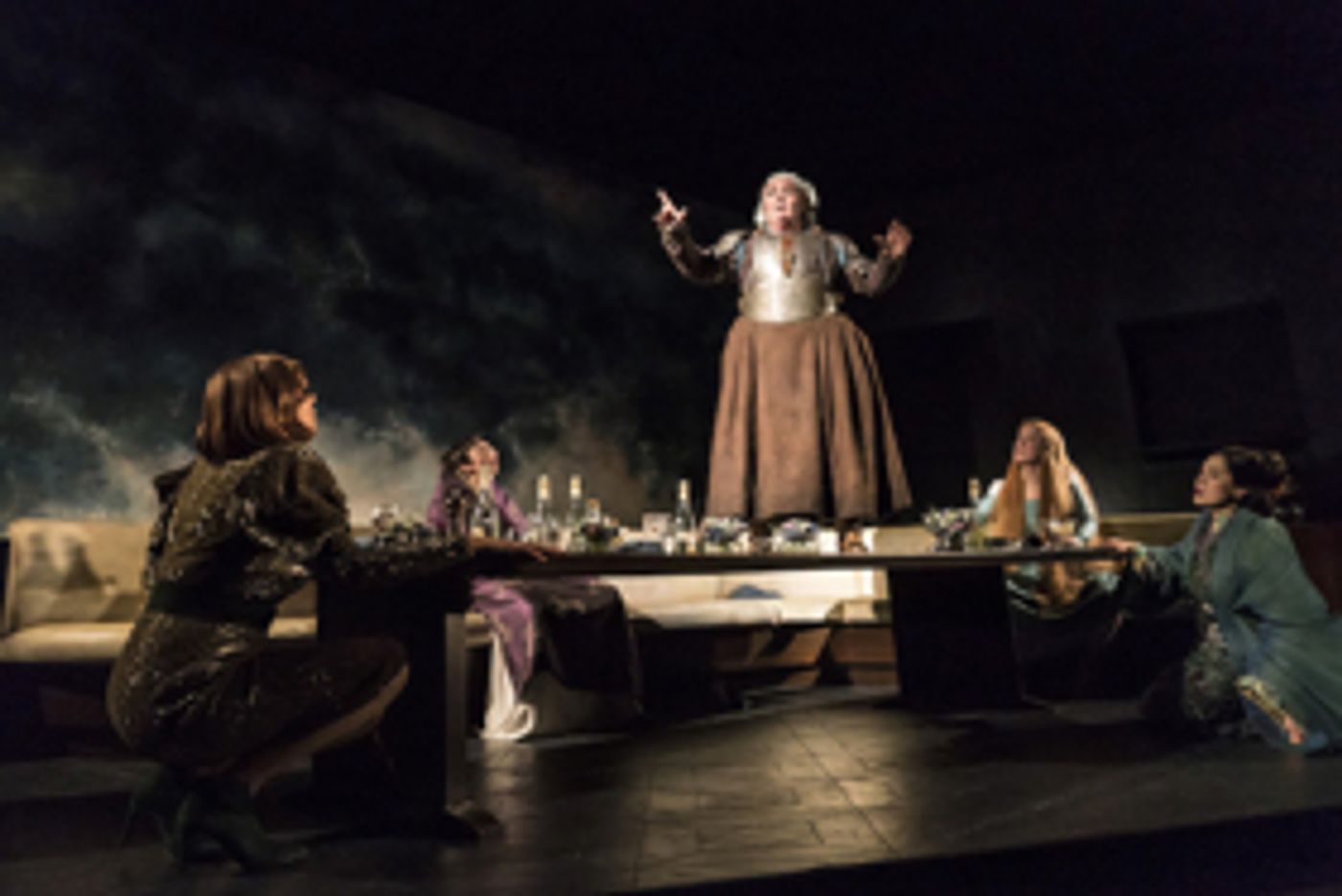Review: TOP GIRLS, National Theatre

![]() Caryl Churchill's ground-breaking 1982 work comes to the National for the first time - and, also a first, with a full cast rather than actors doubling up, as the playwright had originally intended. It adds to the expansive feel of Lyndsey Turner's production, particularly effective in the play's still audacious opening.
Caryl Churchill's ground-breaking 1982 work comes to the National for the first time - and, also a first, with a full cast rather than actors doubling up, as the playwright had originally intended. It adds to the expansive feel of Lyndsey Turner's production, particularly effective in the play's still audacious opening.
Career woman Marlene celebrates her promotion to managing director of an employment agency with a fantasy dinner party attended by both real and legendary women from history: Pope Joan, Victorian explorer Isabella Bird, Japanese courtesan Lady Nijo, Brueghel the Elder subject Dull Gret, and Patient Griselda from Chaucer's Canterbury Tales.
Turner's staging nails the comic juxtapositions of this scene (Pope Joan sharing lofty theological ideas while vigorously grinding a modern pepper mill; the gruff Dull Gret silently dismayed by the empty bread basket), and the fascinating cross-currents between these extraordinary women.
Their speech overlaps in their eagerness to candidly share their experiences in a way that's previously been denied to them, and there's a mix of solidarity (all made sacrifices, from children and lovers to social acceptance and safety) and competition, as they defend their iconoclastic paths and specific worldviews; for example, whether it's better to 'pass' as a man.
The breathless outpouring is matched by the meal's excess, as they dash through several courses - and several bottles of wine - with the inevitable consequences. It perfectly sets up, with dazzling imaginative flair, the play's big questions: what must women do (and give up) to succeed in a man's world, and is the bullish, Thatcherite Eighties attitude towards success a positive development or a destructive force?
Back in reality, Marlene's promotion is both celebrated and envied by her similarly high-powered female colleagues at agency Top Girls, but she also must contend with the resentful sister left behind in Suffolk, along with her struggling teenager Angie - and the familial and maternal roles she's abdicated to pursue her career.
The production is oddly structured, with the interval placed so late that the first half stretches on, and the second winds up feeling slightly anticlimactic. It doesn't really serve the non-linear storytelling, and the epic sweep is at odds with the work's playfulness and very specific rhythms.
The switch to a more naturalistic mode also proves a challenge on the Lyttelton's yawning stage, particularly in the intimate, kitchen sink drama scenes. Ian MacNeil's design provides a clever fix for one by shrinking our view down to a tiny outside space where Angie hides with her friend Kit - and providing a striking contrast to the opulent restaurant we've just occupied - but several exchanges still lack intensity.
The climactic sibling spat should cut deep, as the personal and political mix - Marlene evangelising individualism, and scorning their working-class mother's waste of a life with an alcoholic husband, while the domestic-focussed Joyce counters that not everyone has the luxury of escape and opportunity; it takes more than sheer will and perseverance.
It's vigorously played by Katherine Kingsley and Lucy Black, but ultimately the arguments connect more forcefully than their relationship. It feels slightly too weighted in favour of the sacrificing woman, with Marlene coming off as petulant, and the sharper edges of both characters' arguments are softened. The result is a scene that - especially in contrast to the creatively complex opener - slides towards melodrama.
The lack of double casting also means we lose a sense of unity, and some of the fascinating echoes - seeing the ghost of a past character in the face of a modern one, encouraging us to examine what has and hasn't changed in terms of their choices and challenges.
But, if disparate, each section still has interesting and all-too-resonant material. The Top Girls part sees Marlene confronted by the distraught wife of the man she beat out for promotion, the wife's blunt words shocking today but still present in the workplace's unconscious or insidious biases when it comes to who's deserving of management positions.
Among the candidates interviewed, there's also the fiancée advised not to mention marriage (and potential children) lest it hurt her prospects, and the diligent long-term employee who constantly sees men she trained promoted above her. Gender discrimination is laid bare in Churchill's cleverly crafted vignettes - and, dispiritingly, most still apply today.
Kingsley is a strong anchor, adept at showing how Marlene's tough talk is a cover for her vulnerability and confusion, and there are great turns from Amanda Lawrence as a majestically ethereal Pope Joan, a scene-stealing Ashley McGuire as the reticent Dull Gret, Siobhan Redmond's straight-talking Isabella, and Ashna Rabheru's convincingly childlike Kit.
Liv Hill makes an impressive theatrical debut as the heartbreakingly clumsy, nail-biting, over-eager Angie - the embodiment of those left behind by a ruthless Thatcherite society, too "stupid" and "scared" to make it, even though she shares Marlene's longing to escape.
A flawed but nevertheless welcome revival of a work that speaks forcefully to the present moment - whether the ways women's lives are still constrained, the competing facets of feminism, or the necessity of compassion for all, even as we celebrate ambition.
Top Girls at the National Theatre until 22 June
Read our interview with Siobhan Redmond
Photo credit: Johan Persson
Reader Reviews

Videos

